Papers by Wolfgang Zierhofer
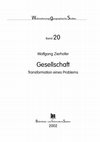
Gesellschaft, modern verstanden, bezeichnet die Differenz zwischen Nationen, Bevolkerungen, Inter... more Gesellschaft, modern verstanden, bezeichnet die Differenz zwischen Nationen, Bevolkerungen, Interaktionen oder Kommunikation auf der einen Seite sowie dem Rest der Welt auf der anderen Seite. In analytischer Hinsicht beruhen derartige Auffassungen auf unbegrundeten, transzendentalen Voraussetzungen. Normativ betrachtet, entpuppt sich der sozialwissenschaftliche Grundbegriff als ein Kastensystem! Eine sprachphilosophisch entwickelte, relationale Erkenntnistheorie erlaubt hingegen einen voraussetzungsloseren Gesellschaftsbegriff: Gesellschaft als artikulierte Qualitat existenzieller Behiehungen. Weder wird a priori zwischen Natur und Kultur unterschieden, noch werden nicht-menschliche Existenzen prinzipiell aus der Gesellschaft ausgeschlossen. Von universalen Geltungsanspruchen wird abgesehen. Die Welt wieder in die Gesellschaft zuruckzubringen, eroffnet insbesondere fur die Sozialgeographie und die Umweltsozialwissenschaften Chancen, sich im Rahmen einer neuen akademischen Ordnung al...
Geographica Helvetica, 1989
Geographica Helvetica, 1998
Geographica Helvetica, 1993
GAIA - Ecological Perspectives for Science and Society, 2007
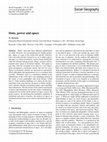
Abstract. “Space ” may take many different significations of which, however, two are paramount fo... more Abstract. “Space ” may take many different significations of which, however, two are paramount for human geogra-phy: Space as a part of the world with specific character-istics and with activities located in or on it (object-space), and space as a frame of reference, used to locate and thereby order the relations among persons, things, activities and im-material items (space as locational scheme). This paper ar-gues that, from the viewpoint of an observer, every object-space presupposes a locational scheme, but not vice versa. Spaces as locational schemes are discussed as instruments, which individuals and organizations use to co-ordinate their activities. Therefore, space is a constitutive element of the reproduction of the social and is not something external to the social, as most geographies and social theories would have it. Under modern conditions, it is, above all, the meta-institution of the state that has the power to define interpre-tative schemes, thereby constituting ent...

Pour resoudre ses problemes ecologiques, une societe democratique depend de la mediation de la sc... more Pour resoudre ses problemes ecologiques, une societe democratique depend de la mediation de la science et des medias. Les citoyens et les citoyennes ne peuvent realiser leur souverainete politique que si ces institutions mettent a disposition les informations necessaires d'une maniere critique et reflechie. Cette exigence est a la base d'une analyse de differentes contributions scientifiques et mediatiques concernant le debat sur la «mort des forets» jusqu'en 1995 en Suisse allemande. Cet article reconstruit un «systeme immunitaire» de la notion de mort des forets. Un systeme qui, allie au manque de reflexion critique de la part des chercheurs, permit de repandre des idees fortement exagerees sur la mort des forets. Les mass-medias eux aussi avaient neglige, dans un premier temps, de remettre en question la documentation recue, et concentre leurs informations sur la politique de l'environnement. Ce n'est qu'en 1988, lorsque les chercheurs se virent contraints...
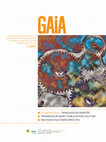
GAIA, 2007
The debate on transdisciplinary research has so far rarely addressed the epistemological and meth... more The debate on transdisciplinary research has so far rarely addressed the epistemological and methodological issues of this new form of scientific practice. With our paper we offer a contribution that attempts to fill this gap. Setting out from a system of knowledge desiderata of “problem-oriented research” we present an empirical analysis of problem-orientation, knowl- edge integration and participation of non-scientific actors in transdisciplinary research projects. The results show that the term “transdisciplinary research” is used for quite heterogeneous project goals and epistemic ends. The results reveal further that methods of knowledge integration are used only on a small scale and that participation often does not primarily serve epistemic ends. Thus, the notion of transdisciplinary research covers projects only in the sense of a family-resemblance, and does not represent a fertile methodological point of reference. Therefore, we propose to relate further methodological considerations with types of knowledge desiderata.

Within the discourse promoting transdisciplinary research (TDR), also referred to as Mode 2 scien... more Within the discourse promoting transdisciplinary research (TDR), also referred to as Mode 2 science, it is often claimed that scientifically coping with urgent life-world problems calls for interdisciplinary participatory research (or TDR), and that this represents a new mode of knowledge production. Although we look upon TDR as a fertile innovation, we have epistemological and methodological concerns in treating TDR as a (singular) new mode of knowledge production. Hence, our paper attempts to contribute to clarifying the meaning of TDR from an epistemological and methodological perspective. We develop a conceptual scheme for the analysis of knowledge production in problem-oriented research, which is subsequently applied to an empirical analysis of 16 transdisciplinary research projects. In our analysis, we focus upon forms of knowledge integration and participation. The results indicate that, from an epistemological point of view, TDR does not represent a specific mode of knowledg...
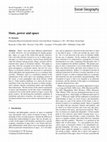
Space" may take many different significations of which, however, two are paramount for human geog... more Space" may take many different significations of which, however, two are paramount for human geography: Space as a part of the world with specific characteristics and with activities located in or on it (object-space), and space as a frame of reference, used to locate and thereby order the relations among persons, things, activities and immaterial items (space as locational scheme). This paper argues that, from the viewpoint of an observer, every objectspace presupposes a locational scheme, but not vice versa. Spaces as locational schemes are discussed as instruments, which individuals and organizations use to coordinate their activities. Therefore, space is a constitutive element of the reproduction of the social and is not something external to the social, as most geographies and social theories would have it. Under modern conditions, it is, above all, the metainstitution of the state that has the power to define interpretative schemes, thereby constituting entities and controlling their interactions. The discussion of the mutual constitution of spaces and institutions reveals that, from a methodological point of view, in the end the analysis of space, society and power coalesce. By disclosing the constitutive conditions of institutions and power structures, the analysis of spaces as locational schemes turns out to also be a deconstructive practice.
Vernunft angesichts der Umweltzerstörung, 1994
GAIA - Ecological Perspectives for Science and Society
GAIA - Ecological Perspectives for Science and Society
GAIA - Ecological Perspectives for Science and Society
GAIA - Ecological Perspectives for Science and Society







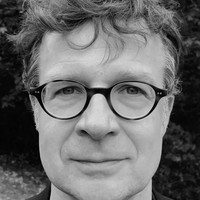



Uploads
Papers by Wolfgang Zierhofer